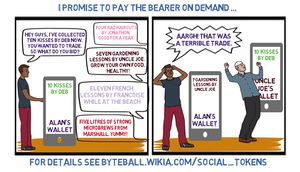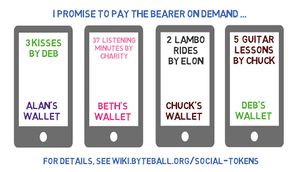Token
"Asset" in financial community = "token" in non-financial community. The words asset, coin, currency and token are all synonymous here to some extent, in that each refers to funds on the Byteball platform.
There is much covered in the Asset article that also applies to tokens, such as creating and naming them. This article's emphasis is on tokens with zero or tiny monetary value, rather than those used more financially.
Contents
Why use tokens?
What advantages do Byteball tokens have over existing systems, like paper notes, plastic tokens, "indelible" ink on a user's skin (think a rock concert pass)?
- Ease of creation: Anyone can create as many identical tokens as needed, at low cost, without a long learning curve, with no third-party permission needed.
- Ease of use: At least, in a community where people normally carry and use smartphones. This includes remote use, not simply face-to-face. All "payees" can be kept in the wallet's "address book" for one-click availability.
- Transparent use: The token creation, and all token movements/transactions can be seen by anyone in Explorer.
- Documented use: Your wallet's history records the exact times and amounts of all your token transactions.
- Certainty of transaction: Like any cryptocurrency, sending any token(s) to an address is irrevocable.
- Verifiability: There's no way one can counterfeit a real platform token. Similarly, the correct token is easy to recognize in the community using it.
- Programmable use: At a minimum, one's token can be used with Byteball's default bots, smart contracts and personal oracles, not merely sent and received.
- High-tech: For optics, if that is important to you. It all looks cutting-edge, rather than 20th Century or even earlier.
Token types
There are four main token types in Byteball. Each is created and named/registered in the same way, but they have different uses. There are also tokens made with no purpose in mind deeper than simply making them.
Fun-coins
Fun-coins deliberately have zero monetary value because they exist in vast quantity. They are intended mainly for practice with smart contracts, textcoins, or other Byteball features, where it doesn't matter if you mess up and lose them somehow.
Family tokens
Family tokens use a single token. The family can obtain 1000 generic tokens, "Credits by Jore Bohne", immediately and free of charge from the fun-coins faucet in their wallet's Bot Store. Or they can create a personalised one, say "Joys by Jill Smart", with a bit more effort. They are used in a family token/reward system, designed to improve kids' behaviour.
Social tokens
Social tokens are intended for use in a local community, maybe a high school or club, where the people involved tend to know each other. These are tokens backed by real-world goods and services that the issuer will provide on demand. The issuer should honour his or her token, whoever presents it for payment.
Commercial tokens
Commercial tokens on the Byteball platform would be used by businesses in a local community. They function in the same way as discount or rebate coupons, usually distributed in print either separately or on a newspaper page; online to be printed out at home by the consumer; or sent directly to a consumer's mobile phone.
Rapid distribution
This needs some preparation. Let's look at a family scene. Mom and Dad and the two kids Jane and Bobby are sitting around the kitchen table. The kids are all excited, holding their new smartphones. Mom has new "Fam" tokens and enough bytes for transaction fees. Jane taps her Receive tab to display the QR code, Mom sends her 10 Fams. After a second it shows up on her phone. Woohoo! Bobby displays his QR code, Mom sets up the 10-Fam transaction, taps Send, and gets an error message. Bobby reacts adversely.
What happened? Normal change-address behaviour. After 5 or 10 minutes, Mom will be able to make the transaction. The same would happen with giving the kids Bytes. Overall, not ideal. How to fix?
Preparation
Before the family meeting, Mom goes into another wallet, and sends to her family-tokens wallet two transactions:
- A multi-address transaction of 3x 100 Fams (the 100 is arbitrary)
- A multi-address transaction of 6x 55,000 Bytes (the 55,000 is arbitrary)
After those two transactions have confirmed, they have the family meeting. Mom will be able to rapidly send three transactions of 100 Fams each (plus the transaction fees), and three transactions of 50,000 Bytes each. Result? Everyone gets their tokens and Bytes promptly.
Other cases
The principle is the same for any gathering. At a meet-up, maybe the Byteball guy expects to distribute 999 Tangos and 100,000 Bytes to 15 people. So he will need to send to his funding wallet:
- A multi-address transaction of 15x 999 Tangos
- A multi-address transaction of 30x 100,000 Bytes
The 30x 100,000 Bytes is for safety. It should be possible to have 15x 100,000 Bytes and 15x 1000 Bytes for the transaction fees, but if the wallet gathers together all 15 1000-Byte inputs to make up part of one 100,000 Byte transaction then one's plan will fail.
Grass roots
Byteball adoption will always be helped by one Byteball fan using the platform tokens (Fun-coins, Family Tokens, Social Tokens, Commercial Tokens) etc with their friends and family, and not just sitting on their GBytes wishing the price would go up more.

